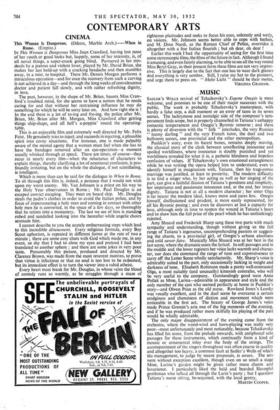CONTEMPORARY ARTS
CINEMA
This Woman Is Dangerous. (Odeon, Marble Arch.)—When in Rome. (Empire.) IN This Woman is Dangerous Miss Joan Crawford, having lost none of her youth or good looks but, happily, some of her intensity, is, of all novel things, a super-crook going blind. Partnered in her mis- deeds by a jealous and violent lover, played by Mr. David Brian, she makes her last hold-up with a cracking headache and then stumbles away, in a mist, to hospital. There Mr. Dennis Morgan performs a miraculous operation—and for once the recovery from such a carving is not achieved in a day—and through the long weeks of convalescence doctor and patient fall slowly, and with rather refreshing dignity, in love.
The past, however, in the shape of Mr. Brian, haunts Miss Craw- ford's troubled mind, for she seems to have a notion that he needs caring for and that without her restraining influence he may do something for which he will be sorry later on. And how right she is ! In the end there is a lot of to-ing and fro-ing, the police after Mr. Brian, Mr. Brian after Mr. Morgan, Miss Crawford after getting things ship-shape, and all hell's a-poppin' round the operating- table. •
This is an enjoyable film and extremely well directed by Mr. Felix Feist. He genuinely tries to inject, and succeeds in injecting, a plausible spirit into corny situations. For instance, One is made palpably aware of the mental agony that a woman must feel when she has to have the bandages removed after an eye-operation--a moment usually whisked through at speed. There are times, of course—they recur in nearly every film—when the reluctance of characters to explain things, thereby clarifying a lot of emotional confusion, is pro- foundly irritating, but on the whole the dialogue, if not scintillating, is intelligent.
Which is more than can be said for the dialogue in When in Rome. To sit through this film is, indeed, a penance that I would not wish upon my worst enemy. Mr. Van Johnson is a priest on his way to the Holy Year observances in Rome ; Mr. Paul Douglas is an escaped convict escaping. They meet on board ship. Mr. Douglas steals the padre's clothes in order to avoid the Italian police, and by force of impersonating a holy man and coming in contact with other holy men he is converted, in the space of a few days, so thoroughly that he retires into a monastery. The last we see of him is standing robed and sandalled looking into the hereafter while angelic choirs serenade him.
I cannot describe to you the acutely embarrassing steps which lead to this incredible denouement. Every 'religious formula, every Boy Scout aphorism, is repeated in different forms at the rate of two a minute ; there are some cosy chats with God which made me, in any event, so shy that I had to close my eyes and pretend I had been translated to another sphere ; and there are some jokes in very poor taste. Presumably this picture, produced and directed by Mr. Clarence Brown, was made from the most reverent motives, to prove that virtue is infectious or that no soul is too lost to be redeemed, but its immediate effect is to turn the viewer into a rabid atheist.
Every heart must break for Mr. Douglas, in whose veins the blood of comedy runs so warmly, as he struggles through a maze of righteous platitudes and seeks to focus his eyes, solemnly and wetly, on visions. Mr. Johnson seems better able to cope with bathos, and M. Dino Nardi, as the Roman Chief of Police, overrides it altogether with a fine Italian flourish ; but oh dear, oh dear ! Earlier this week I'had the oppOrtunity of seeing for the first time some stereoscopic films, the films of the future in fact. Although I found it amusing, and even faintly alarming, to be able to see all the way round Miss Beryl Gray, in their present form these films are not very impres- sive. This is largely due to the fact that one has to wear dark glasses and everything is very sombre. Still, I raise my hat to the pioneers, and urge them to press on. " tMehr Licht " should be their motto.
VIRGINIA GRAHAM.










































 Previous page
Previous page